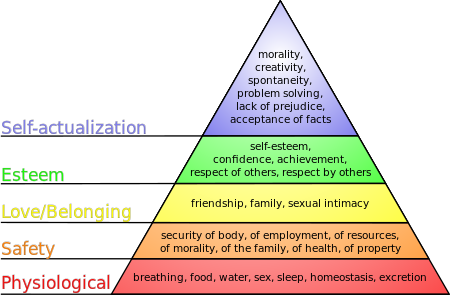Maslow defines a hierarchy, a metaphorical stepladder if you will, which depict the order in which the needs of an individual must be met. He claims that one's motivation for satisfying needs starts at the bottom and in order to move up to the next level, the current level's needs must be met.
"Physiological needs are the most pre-potent of all needs," or in other words, we need food and other basic necessities before we begin to worry about other parts. The next levels, in order, are:
- safety and stability,
- love (both giving and receiving),
- esteem (which includes "importance" and "reputation", but also "independence and freedom"), and
- self-actualization ("doing what he is fitted for")
Here's an easy image to help visual-learner's understand:
I had always heard this theory referenced, but I had never looked up the paper or thought about it in the context of revolution. It can help predict the focus of revolt's based on the lowest-order needs not being accommodated to a group of people and it can help policy-maker's define basic human rights. Maslow's writing can help us understand people's motivations for revolution, especially the differences between revolutions in the developed, developing, and undeveloped worlds. One can see that those without sustainable access to water are not worried about being free but that politically stable countries containing people with high self-esteem will focus on creative problems, revolutions in technology, and other problems further up the hierarchy.
